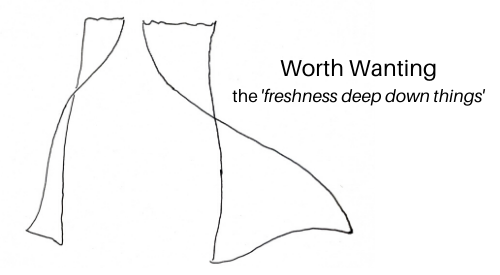
I use fountain pen, a Lamy, with blue ink (sweet instrument) to jot down notes and trains of thought in little 4×6 pocket memo books, usually filling them up every two to three weeks. No one reads them, or would want to. Indeed, though I have a stacks of beat-up and worn notebooks, I don’t go back and read them. But, here’s the question, does freshness?
If our relationship is friendship, then the contents of these notebooks then as I wrote them, and now, are what freshness would be interested in. Likewise, I would be interested to discuss with freshness what it has done and is doing. And together we can think of joint initiatives ahead. That is, if freshness is my friend, and I am the friend of freshness.
In a previous post, Prayer and Freshness, part 1, I presented a way we may be in communication with freshness in private, personal, prayer-like encounters. So then, what might such encounters be like? Do they include regular reassurance that the other is still there and still cares? Are such encounters possibly real or relevant in extreme situations like the cell block or the ICU?
What about friendship between fragiles (each of us, collective fragility) and freshness, that is, between us of the mundane and that of the transcendent? What kind of friendship can that be? Because fragility and freshness are even more different than, say, tortoises and hippos, or we and trees.
We, fragility, is all particularity; freshness is all potentiality. We act in the material realm; freshness acts in the transcendent realm. We operate under different constraints. We are driven by different motives. We bring to our friendship different perspectives and priorities.
Where we meet is in episodic encounters–occasions of making common cause with the livingness of an other addressed as you–over the course of our lifetime (and, I think, beyond). It’s in those encounters that friendship plays out.
Each friendship is unique, but friendships generally have some common features.
Friends share companionable moments together. There’s the immediacy of each other’s presence. Fragility brings an acute awareness of the particulars of the occasion and its context, the this-here-nows, the what is there, whereas freshness brings a sensitivity to what can be, and the what can come. We enjoy each other.
Friends keep in touch, reaching out to the other. Fragility sets aside special time for encountering freshness, and freshness continually whets our appetite for encounters.
Friends give gifts. The gifts of freshness include new horizons, new interests, new challenges, and new others to encounter. Our gifts are our eyes, seeing the world with particular points of view, and our hands, our ability to act in the world to initiate encounters with other others.
Friends share their hard experiences. In our case, these include the dramas of our livingness: certainty vs doubt, trust vs suspicion, attention vs neglect, ambivalence, ambiguity, dilemmas, all under the cloud of failure, loss and death. Grief at loss and fear of the future nag and gnaw us, all deeply linked to the fact we live in a world of scarcity and fragility.
For freshness, what’s hard is the anguish of being witness to all the suffering of the world and not able to directly intervene. There’s also disappointment at all the opportunities lost, all the potentialities never realized. Freshness grieves over the refusal to encounter and the rejections of the friendship and foreclosure of occasions to share itself and its ambitions with the other. The extinction of cultures, societies, civilizations and what they could yet have been is sad fact for freshness, even though all the encounters that occurred within their contexts still remain lasting and lively
Freshness shares the sorrows (and joys) of all it joins with in encounter, so whereas our sorrows pertain to us and what we care about, the sorrows of freshness pertain to the travails of sufferers all over the world, and so indirectly are ours as well.
Friends forbear and forgive. We refrain from blaming freshness for not solving problems that are ours to deal with, for not intervening. Likewise freshness forgives what we do and find we’ve done in the confusing urgency of our situations.
Friends are interested in each other and make inquiry. So freshness wants to know what its like to be a local entity among others. We want to know what it’s like to be cosmic and single.
Friends share memories. Encounters of the past remembered and reflected on are grist of new encounters, compelling content of our companionship. We each have an extensive history of prior encounter episodes. Freshness has been in our lives from the beginning, even if we’ve not been aware or ready to acknowledge it.
Friends make common cause, support each other’s agendas. Freshness wants what we want, and we want what freshness wants. In many cases, there’s overlap, but common cause means trusting the validity of what the other wants even if it isn’t our concern. So are motivated by survival, comfort and dignity; freshness’ modus is hospitality, friendship and exploration. These are more or less relevant to each other in different situations. Making common cause is accepting and supporting the relevance assessments of the other. We prioritize direct and definite encounters, whereas freshness equally values indirect and indefinite encounters (systemic) which make good luck more likely. We privilege ourselves and ours, but freshness privileges all equally.
Friends help and assist each other. Encounters are the answers to requests we both, fragility and freshness, make to each other. We help freshness by listening and responding to its prompts to initiate encounters with others. Freshness helps us first of all by encouraging us, comforting us and inspiring us directly in our private, personal encounters. Freshness also activates its global network of encountermates to act in ways that can material assist, even rescue us. Likewise, the requests we make on behalf of others, freshness is able to ‘crowdsource’ help through the encounters it has with other others everywhere.
Even ICU and cell block encounters occur in a context. It’s never just the two of us–me fragile, you freshness–but around us other patients or prisoners, nurses or guards, family and friends present or past, a political situation, etc. that each of us and both of us can encounter, directly or indirectly.
Sometimes rescue comes through a happy convergence of material circumstances, but the help freshness gives us comes through encounters, not coincidences.
Through it all, we, freshness and fragility, though others, are yet lovers. Prayer-like encounters can be the intimate place where we most deeply appreciate that reality.
